|
|
|
Sort Order |
|
|
|
Items / Page
|
|
|
|
|
|
|
| Srl | Item |
| 1 |
ID:
088137
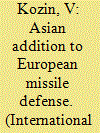

|
|
|
|
|
| Publication |
2009.
|
| Summary/Abstract |
THE GEORGE W. BUSH ADMINISTRATION, which has departed from the political arena, has left new President Barack Obama not only a host of unresolved regional problems, but also an array of issues concerning such a sensitive subject as arms control. The White House has effectively shelved such problem areas as further reduction of strategic offensive weapons (capabilities), tactical nuclear weapons, and control over five key types of conventional weapons in Europe, failing, together with its NATO partners, to ratify the well-known Treaty on Conventional Armed Forces in Europe (CFE).
Now Moscow and Washington will also have to deal with such a sensitive issue as the so called European missile shield - i.e., the deployment of U.S. strategic missile defense systems in Poland and the Czech Republic, planned by the previous Republican administration for deployment by 2011 - if established, they will account for around 25% of the U.S.'s entire strategic missile defense capability.
In this context, special attention also needs to be given to such a problem as the strategic and tactical missile defense system 1 that the United States has widely deployed and constantly upgrades in the Asia Pacific region - a system that has been left, as it were, outside the international debate due to the prominence given to Washington's plans to extend its "missile shield" to eastern Europe, closer to the Russian borders
|
|
|
|
|
|
|
|
|
|
|
|
|
|
|
|
| 2 |
ID:
145283
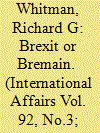

|
|
|
|
|
| Summary/Abstract |
A major public debate on the costs and benefits of the United Kingdom's membership of the European Union is presently under way. The outcome of the referendum on 23 June 2016 will be a pivotal moment in determining whether the EU has a future as a component of the UK's European diplomatic strategy or whether there is a major recalibration of how the UK relates to Europe and more widely of its role within international relations. Since accession to the European Economic Community the UK has evolved an uncodified, multipronged European diplomatic strategy. This has involved the UK seeking to reinforce its approach of shaping the security of the continent, preserving a leading diplomatic role for the UK in managing the international relations of Europe, and to maximize British trade and investment opportunities through a broadening and deepening of Europe as an economically liberal part of the global political economy. Since accession the UK's European diplomatic strategy has also been to use membership of the EU to facilitate the enhancement of its international influence, primarily as a vehicle for leveraging and amplifying broader national foreign and security policy objectives. The strategy has been consistent irrespective of which party has formed the government in the UK. Increasing domestic political difficulties with the process of European integration have now directly impacted on this European strategy with a referendum commitment. Whether a vote for a Brexit or a Bremain, the UK will be confronted with challenges for its future European strategy.
|
|
|
|
|
|
|
|
|
|
|
|
|
|
|
|
| 3 |
ID:
085317
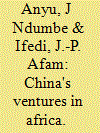

|
|
|
|
|
| Publication |
2008.
|
| Summary/Abstract |
Africa has a long and disturbing history with outside powers exploiting the continent for its natural and human resources in furtherance of their own economic and developmental objectives. In this essay, China's main objectives and the prospects and implications these have on Africa's development are examined. The authors argue that there are two very important perspectives-exploitation and opportunity-on China's role in Africa's development. The authors also argue that African countries must implement meaningful structural and policy changes that could enable them to leverage China's involvement to enhance their development. Whether Chinese interest and involvement brings the danger of renewed exploitation without accompanying sustainable development depends on the extent to which African countries are able to take advantage of the opportunities of this growing interest and transform themselves by circumventing the many economic, political, and social contradictions that are afflicting them.
|
|
|
|
|
|
|
|
|
|
|
|
|
|
|
|
| 4 |
ID:
094082
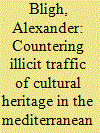

|
|
|
|
|
| Publication |
2010.
|
| Summary/Abstract |
Some of the most thrilling movies of all time depict imaginary or real thefts of artifacts from well-known museums. Topkapi (1964) is about the theft of the Ottoman Sultan's jewel-encrusted dagger from the Istanbul Museum; Entrapment (1999) is about the world's greatest art thief and his plans for the theft of a highly secured piece of artwork. More realistically, most people tend to turn to a news report on art stolen or recovered before they read their usual daily dose of hard news. Art and artifacts definitely capture the collective imagination. Art is usually viewed as the better dimension of human personality, while art thieves often enjoy a degree of infamy not usually associated with other kinds of felonies.
|
|
|
|
|
|
|
|
|
|
|
|
|
|
|
|
| 5 |
ID:
086563
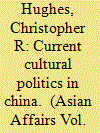

|
|
|
|
|
| Publication |
2009.
|
| Summary/Abstract |
The article begins with an analysis of China's past in terms of the interplay between Confucian teaching, local, or folk, tradition and the impact of foreign culture. There then follows an examination of the current situation in terms of continuity and change, with particular emphasis on alienation and the rise of nationalism in a post-Marxist society. The article concludes with a critique of Wolf Totem.
|
|
|
|
|
|
|
|
|
|
|
|
|
|
|
|
| 6 |
ID:
167980
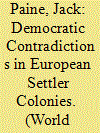

|
|
|
|
|
| Summary/Abstract |
How did political institutions emerge and evolve under colonial rule? This article studies a key colonial actor and establishes core democratic contradictions in European settler colonies. Although European settlers’ strong organizational position enabled them to demand representative political institutions, the first hypothesis qualifies their impulse for electoral representation by positing the importance of a metropole with a representative tradition. Analyzing new data on colonial legislatures in 144 colonies between the seventeenth and twentieth centuries shows that only British settler colonies—emanating from a metropole with representative institutions—systematically exhibited early elected legislative representation. The second hypothesis highlights a core democratic contradiction in colonies that established early representative institutions. Applying class-based democratization theories predicts perverse institutional evolution—resisted enfranchisement and contestation backsliding—because sizable European settler minorities usually composed an entrenched landed class. Evidence on voting restrictions and on legislature disbandment from Africa, the British Caribbean, and the US South supports these implications and rejects the Dahlian path from competitive oligarchy to full democracy.
|
|
|
|
|
|
|
|
|
|
|
|
|
|
|
|
| 7 |
ID:
085849
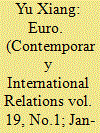

|
|
|
|
|
| Publication |
2009.
|
| Summary/Abstract |
2009 marks the 10-year anniversary of the launch of the euro, a historic undertaking which drew a veil over centuries of conflict and set Europe on an unprecedented path of cooperation and integration.
|
|
|
|
|
|
|
|
|
|
|
|
|
|
|
|
| 8 |
ID:
084661
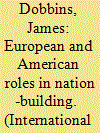

|
|
|
| 9 |
ID:
084101
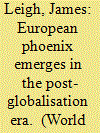

|
|
|
|
|
| Publication |
2008.
|
| Summary/Abstract |
Throughout history empires and their civilisations have come and gone. However, Europe as a unique civilisation (and reccurring empire) has stood the test of time, surviving all wars and perils of the past. From this background the European Union may, under the stewardship of its leading nations, take up a central position in the present post-globalisation world of superpower rivalry. As the fateful bellows breathe these winds of chage are we about to see the smiths of Europe strike the anvil of history to forge a newly tempered Europe in the heat of the newly forming multi-polar world?
|
|
|
|
|
|
|
|
|
|
|
|
|
|
|
|
| 10 |
ID:
147183
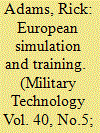

|
|
|
| 11 |
ID:
112646
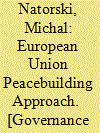

|
|
|
|
|
| Publication |
Frankfurt, Peace Research Institute Frankfurt (PRIF), 2011.
|
| Description |
ii, 37p.Pbk
|
| Series |
PRIF report no.111
|
| Standard Number |
9783942532358
|
|
|
|
|
|
|
|
|
|
|
|
Copies: C:1/I:0,R:0,Q:0
Circulation
| Accession# | Call# | Current Location | Status | Policy | Location |
| 056476 | 341.242/NAT 056476 | Main | On Shelf | General | |
|
|
|
|
| 12 |
ID:
145536
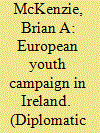

|
|
|
|
|
| Summary/Abstract |
The European Youth Campaign was a youth group covertly funded by the Central Intelligence Agency to promote European unification and security arrangements. It was created in response to the Soviet sponsored 1951 World Festival of Youth and Students held in Berlin. The Irish branch, which was active until 1958, offers a useful case study to examine the intersection of international Cold War politics and domestic concerns about youth deviance and the impact of American mass culture. Irish organizers hosted conferences and engaged in a broad publicity campaign. The European Youth Campaign also illustrates aspects of Americanization. Irish delegates stressed the contribution Ireland could make to the moral rearmament of Europe while at the same time debating the impact of productivity and materialism on Irish society. This study thus expands our understanding of Irish-European integration debates and shows how a small, neutral country participated in the cultural Cold War.
|
|
|
|
|
|
|
|
|
|
|
|
|
|
|
|
| 13 |
ID:
080525
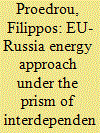

|
|
|
|
|
| Publication |
2007.
|
| Summary/Abstract |
This essay aims to analyse and interpret the EU-Russia approach in the energy sector under the prism of interdependence. It seeks to account for both the increasing cooperation among EU member-states and Russia as far as security of supplies is concerned, but also provides a sound explanation for the steady clashes between the two sides. For this reason, we use the terms sensitivity and vulnerability to refer to the position that each side holds on bilateral energy matters and, accordingly, to the actions it is capable of taking to resolve its problems. This model of interdependence provides a profound understanding of the bifurcated relationship between the EU and Russia and interprets both its cooperative and conflictive elements.
|
|
|
|
|
|
|
|
|
|
|
|
|
|
|
|
| 14 |
ID:
174486
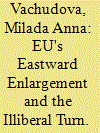

|
|
|
|
|
| Summary/Abstract |
What keeps European states committed to the EU project has not changed: it is economically much better to be inside the bloc than outside.
|
|
|
|
|
|
|
|
|
|
|
|
|
|
|
|
| 15 |
ID:
175446


|
|
|
|
|
| Summary/Abstract |
President Donald Trump has adopted a critical position on NATO, raising concerns of an American abandonment of its obligations to Europe’s defence. The severity of Trump’s position is unusual, but some of his concerns are of long-standing and likely to be voiced in some form by his successor in the White House. American criticism and equivocation has led the European allies to engage in various forms of hedging. Some of these strategies are designed to keep the US attached to NATO; others bypass the alliance – cultivating either bilateral links to the US or a strengthening of EU defence cooperation. Hedging, whatever its form, is potentially damaging to alliance effectiveness and cohesion. In that light, NATO’s interests are better served by a strategy which builds upon the NATO-EU relationship and which advertises the benefits of European effort within NATO itself. To that end, we argue in favour of a reformulation of an old but much misunderstood idea – that of NATO’s “European pillar.” Here, existing contributions to European defence provided by the allies through NATO are crucial. Such an arrangement need not, therefore, entail any elaborate institutional engineering, but it does require political and strategic clarity.
|
|
|
|
|
|
|
|
|
|
|
|
|
|
|
|
| 16 |
ID:
172920


|
|
|
|
|
| Summary/Abstract |
This article is first to report on the secret European five-partner sigint alliance Maximator that started in the late 1970s. It discloses the name Maximator and provides documentary evidence. The five members of this European alliance are Denmark Sweden, Germany, the Netherlands, and France. The cooperation involves both signals analysis and crypto analysis. The Maximator alliance has remained secret for almost fifty years, in contrast to its Anglo-Saxon Five-Eyes counterpart. The existence of this European sigint alliance gives a novel perspective on western sigint collaborations in the late twentieth century. The article explains and illustrates, with relatively much attention for the cryptographic details, how the five Maximator participants strengthened their effectiveness via the information about rigged cryptographic devices that its German partner provided, via the joint U.S.-German ownership and control of the Swiss producer Crypto AG of cryptographic devices.
|
|
|
|
|
|
|
|
|
|
|
|
|
|
|
|
| 17 |
ID:
084662
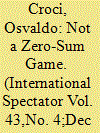

|
|
|
| 18 |
ID:
149356
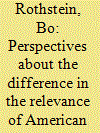

|
|
|
| 19 |
ID:
145863
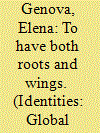

|
|
|
|
|
| Summary/Abstract |
Bulgarian migrants and university students in particular have recently fallen into the spotlight of British media, firmly positioned within fervent immigration debates. Drawing on Brewer’s concept of nested identities, this paper explores how Bulgarian university students in the UK manage four different identifications: national, European, migrant and student. Thus, the process of establishing nested identities is investigated on three different contextual levels: the transnational, regional and the everyday (at university and at the workplace). Paying particular attention to the factors that influence the process, this article also scrutinises its implications for Bulgarian students’ values and perceptions. Utilising semi-structured interviews and participant observation with Bulgarian students, this paper will argue that the four identifications emerge as highly dynamic, context-specific and constantly negotiated relationships. Retrospectively, this article aims to contribute not only to current literature on Bulgarian migration but also to wider debates on transnational youth identities.
|
|
|
|
|
|
|
|
|
|
|
|
|
|
|
|
| 20 |
ID:
168760
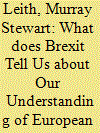

|
|
|
|
|
| Summary/Abstract |
This paper reports on a number of Eurobarometer surveys undertaken by the European Commission as a way of reflecting on Brexit and the challenges it poses to European identity. Our work with the surveys has been undertaken in the context of developing an educational game (RU EU?) which will explore European identity. European citizenship and identity have been strongly promoted by the EU but, while they appear to have been accepted at an elite level, the EU—and the UK in particular—have so far not constructed a narrative which has been supported by ‘ordinary’ citizens. Brexit has therefore exposed the failings of European elites in this regard. That said, there is some evidence that the complexities of Brexit have led to a strengthening of European identity in the other EU 27 countries.
|
|
|
|
|
|
|
|
|
|
|
|
|
|
|
|
|
|
|
|
|